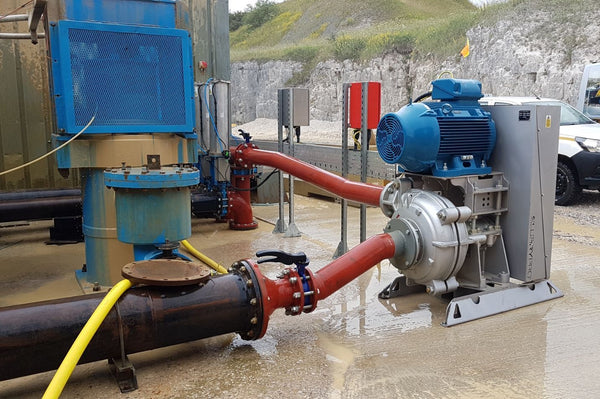Quarry Reduces Filter Press Cycle Time to Boost Production
Overview
Client: Breedon
Challenge: Increasing Filter Press throughput efficiently
Solution: SlurryPro centrifugal pump package for 1st stage, fast feed fill
Result: 40% increase in filtration throughput.

Case Study
This 125-year-old quarry in the High Peak produces high-purity white limestone aggregate and also has an asphalt plant on site. Part of the local Derbyshire scene since 1899 and bordering the Peak District National Park, it has permitted reserves until at least 2046.
This quarry produces around 1.4 million tons of mineral a year, including specialty material supplied to a local producer and global supplier of calcium carbonate chemicals and pigments.
Following a successful planning application to extend the quarry site in 2021, the plan is to begin the restoration of previously quarried areas starting in 2026. They will be using dried filter cake in the land restoration phase, a by-product of the quarry which is currently being collected and stored onsite.
The filter cake is dewatered in two Latham filter presses, which are essential for the continual processing of the slurry from the washplant, as the quarry has no available space for wedge pits or settlement lagoons.
Whilst the filter presses, installed in 2021, are robust and offer a relatively high throughput, other efficiency gains across the plant led to them becoming the pinch point in production. The cycle time on each filter press was between 2 hours and 2 ½ hours depending on silt content. It came to a point that the washplant had to be slowed down to match the dewatering presses’ capacity, ultimately resulting in reduced efficiency throughout the entire operation.
Filter presses rely on high-pressure feeds (in this case from water pumped from a 1 million-gallon tank) to separate liquid and solids through a filtration membrane. These presses can dewater high volumes of slurry containing fine silt, which can be difficult to filter quickly using other methods.
Due to the high-pressure requirements, filter presses are often fed by ram pumps, a positive displacement type of pump. However, whilst delivering high pressure, PD ram pumps often struggle to compete with centrifugal pumps on flow rate.
Working with Atlantic quarry project lead Deryck Harmer, a focused study on the filter press system was conducted, to look for optimisations in the filter pumping operation.
Retaining the best of the current filter press setup, Atlantic Pumps designed a way to reduce the cycle time, increase the throughput, and reduce energy wastage.
The solution was an additional stage of pumping involving a high-chrome lined, 55kWh 6x4 SlurryPro centrifugal pump which gives each filter press an initial fast-fill in turn.
When the slurry feed pressure reaches 5.5bar (approx. 80 psi), a set of automated valves switches the supply over to the ram pump, which takes the pressure up from there. This leaves the centrifugal available to begin the next filling on the other press.
This single capital investment has maximised the capability of the entire plant and increased the ROI on their investment in the Latham filter presses.
A multi-stage centrifugal pump arrangement is good for certain high-pressure applications, however for this particular situation, supplementing the existing ram pump made perfect sense. Both the centrifugal pump and ram pump are operating within their best efficiency windows, reducing energy consumption, wear and downtime. The initial fast fill provided by the SlurryPro centrifugal has reduced the filter press cycle time by an average of 35 minutes, resulting in an increase in production from 250 – 270 tons per hour to as much as 370 t/p.
Deryck Harmer is enthusiastic about the potential for increasing efficiency and improving the bottom-line profits of aggregate sites or quarries.
“Our mission at Atlantic Pumps is to deliver robust improvements to quarry and aggregate production processes, using proven solutions delivered with market-leading speed of service and ongoing support.
“There’s still potential for many sites to further reduce their financial and environmental costs, and maximise the benefits of responsible mineral extraction and recycling for all stakeholders.”
Atlantic Pumps strengths are designing and manufacturing systems for abrasive slurry handling, and water treatment for wastewater in cement, aggregate, and other mineral industries.


